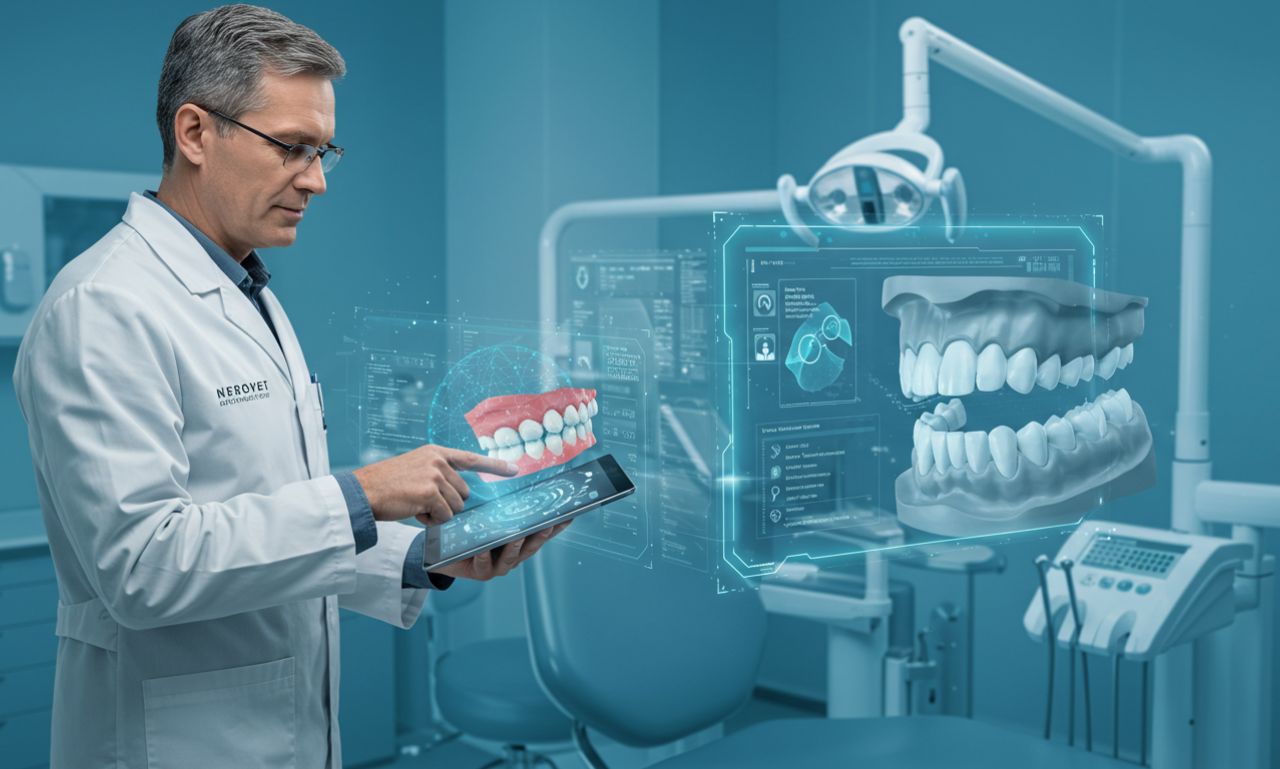The world of dentistry is undergoing a transformation, and at the forefront of this revolution is Nerovet AI Dentistry. Imagine walking into your dental clinic and receiving a diagnosis that not only identifies issues but also tailors treatment to your unique needs with remarkable precision. This innovative technology harnesses the power of artificial intelligence to enhance both diagnostic accuracy and treatment efficacy, offering patients better outcomes than ever before. As we dive deeper into what Nerovet AI Dentistry entails, you’ll discover how it’s changing the landscape for practitioners and patients alike—making dental care smarter, faster, and more effective than traditional methods could dream of!
What is nerovet ai dentistry?
Nerovet AI dentistry represents a groundbreaking fusion of artificial intelligence and dental practice. This innovative approach leverages advanced algorithms to enhance diagnostic accuracy and treatment planning.
At its core, Nerovet AI analyzes vast amounts of data from patient records, imaging studies, and clinical findings. By identifying patterns that may escape human observation, it aids in recognizing early signs of dental issues.
This technology streamlines workflows for dentists while ensuring patients receive personalized care tailored to their unique needs. The integration of machine learning not only boosts efficiency but also enhances the overall patient experience.
With tools designed for everything from routine check-ups to complex procedures, Nerovet AI is reshaping how practitioners engage with both patients and diagnostics. As this technology continues to evolve, so too will the standards of care within the field of dentistry.
Benefits of Using AI in Dentistry
AI in dentistry brings numerous advantages, reshaping how professionals approach patient care. One of the most significant benefits is enhanced diagnostic accuracy. AI algorithms analyze vast amounts of data swiftly, identifying patterns that might elude human eyes.
Efficiency also sees a boost with AI technologies. Routine tasks become automated, allowing dental practitioners to focus more on complex cases and patient interactions.
Predictive analytics is another game changer. With access to historical health data, AI can forecast potential issues before they arise, enabling proactive treatment plans tailored for each individual.
Moreover, personalized treatment options are now within reach thanks to machine learning capabilities. Dentists can customize procedures based on precise measurements and past outcomes.
Improved patient engagement stems from clear communication facilitated by AI tools. Patients gain a better understanding of their conditions and treatments through visual aids and interactive platforms designed by intelligent systems.
How Nerovet AI is Revolutionizing Diagnosis and Treatment
Nerovet AI is transforming how dental professionals approach diagnosis and treatment. By harnessing advanced algorithms, it analyzes patient data rapidly and accurately. This technology identifies patterns that may go unnoticed in traditional assessments.
With its ability to process large datasets, Nerovet AI provides insights into potential oral health issues earlier than ever before. Dentists can make informed decisions based on real-time information tailored to each patient’s history.
Moreover, the integration of Nerovet AI reduces human error during diagnostics. It enhances treatment precision by suggesting customized care plans grounded in comprehensive analysis.
The collaborative nature of this tool promotes a more interactive experience between patients and practitioners. Patients feel empowered as they engage with their own healthcare journey, armed with knowledge derived from advanced technology.
As practices adopt Nerovet AI, the standard of care elevates dramatically across the board—ushering in an era where innovation meets dentistry seamlessly.
Case Studies: Real Life Examples of Improved Outcomes with Nerovet AI
One notable case involved a dental clinic in New York that integrated Nerovet AI into their diagnostic process. Prior to using the technology, they struggled with accurately identifying early-stage cavities. With Nerovet AI’s advanced imaging analysis, the clinic reported a 30% increase in cavity detection rates within just three months.
Another compelling example comes from a pediatric dentistry practice in Texas. They faced challenges diagnosing oral abnormalities in children due to limited cooperation during exams. By employing Nerovet AI’s intuitive software, dentists could analyze scans quickly and effectively, leading to more accurate diagnoses without causing additional stress for young patients.
A further illustration is found at an orthodontics center that implemented this innovative approach for treatment planning. The result? A reduction in average treatment time by 20%. Enhanced precision allowed for tailored solutions specific to each patient’s needs, showcasing how effective Nerovet AI can be when applied thoughtfully across diverse settings.
Concerns and Limitations of AI in Dentistry
While nerovet AI dentistry brings remarkable advancements, it also raises several concerns. One significant issue is the reliance on algorithms that may not fully understand the nuances of human anatomy. Misdiagnosis can occur if data inputs are inaccurate or incomplete.
Additionally, there’s a fear of depersonalization in patient care. Many patients appreciate the human touch during consultations and treatments. An over-reliance on technology could diminish these essential interactions.
Data privacy poses another challenge. With sensitive health information being processed by AI systems, ensuring robust cybersecurity measures is critical to protect patient confidentiality.
Moreover, training dental professionals to effectively use this technology requires time and resources that some practices may lack. This discrepancy could widen the gap between technologically advanced clinics and those still relying on traditional methods.
The limitations of neural networks might restrict their ability to adapt quickly to emerging dental trends or unique cases.
Ethical Considerations
The integration of Nerovet AI in dentistry raises important ethical considerations. Patient privacy is a primary concern. With vast amounts of data collected, ensuring confidentiality and secure handling becomes paramount.
Moreover, there’s the question of accountability. If an AI system misdiagnoses or recommends inappropriate treatment, who bears responsibility? This issue necessitates clear guidelines for practitioners using such technology.
Bias in algorithms also poses significant risks. If the training data doesn’t represent diverse populations accurately, it may lead to disparities in care outcomes across different demographics.
Informed consent takes on new dimensions with AI involvement. Patients should be fully aware when AI tools are part of their diagnosis or treatment plan and understand how these systems function alongside human expertise.
The Future of Dentistry with AI Technology
The future of dentistry is poised for a remarkable transformation with AI technology at the helm. As machine learning algorithms advance, they will enable practitioners to analyze vast amounts of patient data swiftly and accurately.
Imagine diagnosing conditions earlier than ever before, allowing for prompt treatment. AI tools can identify patterns in X-rays or scans that even seasoned professionals might miss. This precision not only enhances outcomes but also builds trust between patients and their dentists.
Moreover, personalized treatment plans tailored to individual needs will become standard practice. With every interaction, AI systems learn and adapt, improving care quality consistently.
Tele-dentistry powered by AI will ensure more accessible services across various demographics. Patients in remote areas could receive expert consultations without traveling long distances.
As these technologies evolve, the synergy between human expertise and artificial intelligence promises an exciting horizon for oral health care delivery.
Conclusion
As we navigate the exciting landscape of nerovet AI dentistry, it’s clear that this technology is not just a trend—it’s a transformative force in dental care. Enhanced precision in diagnosis and treatment can lead to better patient outcomes and improved overall health.
By integrating artificial intelligence into everyday practice, dentists can provide personalized care tailored to each patient’s unique needs. The benefits are evident through real-life case studies showcasing remarkable improvements in diagnostics and efficiency.
However, as with any innovation, there are concerns regarding implementation, ethics, and reliance on technology. Addressing these issues will be crucial for the continued advancement of AI within dentistry.
Looking ahead, the future promises even more sophisticated applications of nerovet AI dentistry. As practitioners embrace this change, patients can expect higher standards of care that leverage both human expertise and cutting-edge technology.
The journey has only begun; staying informed about these developments ensures everyone involved enjoys the full advantages offered by this groundbreaking approach to dental health.

